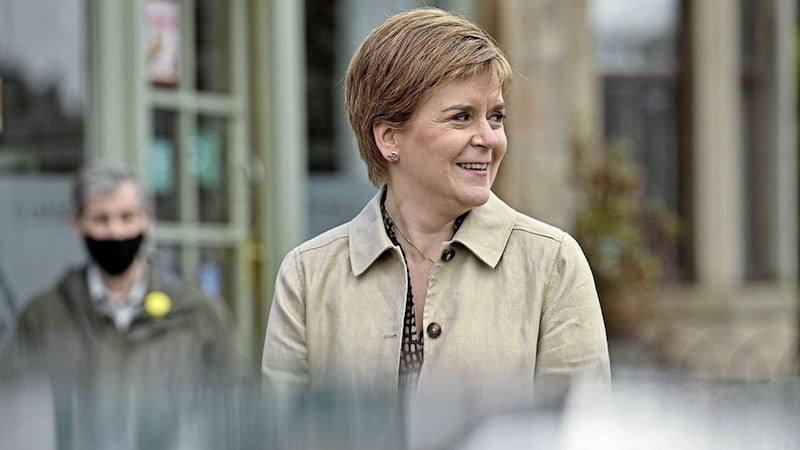IT was only when I moved to Belfast for a number of years in the late 1990s, reporting on the peace process and other news, that I came to realise the importance of the link between the north and Scotland, especially for unionists.
Down south, despite the Gaelic connection, the home of the highlands isn’t often mentioned. In truth, the world map in people’s heads is currently dominated by places like Spain and the prospect of getting there again at an early stage.
Nevertheless the Scots could play a key role in the future of our 32-county island. Tomorrow’s election to the Scottish Parliament might well generate waves that could wash up on the shores of Antrim and Dublin, Down and Wicklow, Derry/Londonderry and Kerry/The Kingdom.
Voters are due to elect 129 Members of the Scottish Parliament (MSPs) which means Nicola Sturgeon and the Scottish National Party (SNP) need to go from their current 61 seats up to 65 to achieve a single-party majority. If they don’t reach that target, they might still be in charge with the aid of the Greens. The recently-founded Alba party, headed by former SNP leader Alex Salmond, might also be needed to make up the numbers, which would involve overcoming the major rift between Sturgeon and her predecessor in recent times.
When the question, “Should Scotland be an independent country?” was posed in a referendum on September 18, 2014, a majority at 55.3 per cent said “No” and 44.7 per cent said “Yes”, out of 3.6 million votes cast. That might have put the issue to bed for a long time but, two years later, the Brexit referendum took place, with Scotland voting to remain in the European Union by 62 to 38 per cent, whereas the UK as a whole opted to leave by 52 to 48 per cent. This helped to fuel demands for a second independence vote: Nicola Sturgeon wants it held by late 2023 but Boris Johnson, who has a say in the matter, declared that referendums “should be only once-in-a-generation”.
We’ve already marked an historic day this week, since Monday was the centenary of partition and the founding of Northern Ireland on May 3, 2021. However tomorrow, May 6, may turn out to be another major date as voting takes place in Scotland’s general election. We should know the final result by Saturday afternoon or evening. The latest poll to hand at time of writing, a Panelbase survey for the Sunday Times, indicates that the SNP will win the election but perhaps with a majority of only one seat. Polling on Scottish independence has been a bit of a see-saw lately and the figures in this poll are 48 per cent in favour, 45 per cent against and six per cent undecided.
If the cause of Scottish nationalism gets a boost in the election, it will raise further doubts about the future of the United Kingdom as presently constituted. It seems a safe prediction, however, that no matter what happens in political terms in Caledonia, it will not lead to violence in that country. Sadly, we can’t have the same confidence about political developments in Northern Ireland.
The coverage of Arlene Foster’s recent withdrawal from the political limelight included the badly damaged bus that was subject to a bomb attack when, as a 17-year-old, she was travelling to school in the vehicle on June 28, 1988. The driver was a part-time member of the Ulster Defence Regiment and the idea that anyone would attempt to blow up a school-bus or any form of public transport is almost beyond belief – but it happened. More recently we saw terrifying coverage of a bus that was hijacked and burnt out by loyalist youths in the Shankill Road area. Neither side has a monopoly on this kind of behaviour.
I find myself thinking back to that terrible day in August 1976 when three children were killed by a car whose driver, IRA activist Danny Lennon, had been shot dead by the British Army. That led to the foundation of the Peace People and I see from their website www.peacepeople.com that they are still campaigning on similar issues, right throughout the world. A welcome sign that there’s hope for us yet.
Email: Ddebre1@aol.com; Twitter: @DdeBreadun








